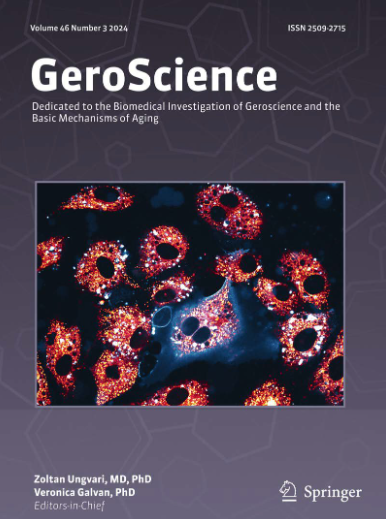The associations between playing a musical instrument and grey matter in older adults at risk for dementia: a whole-brain VBM analysis.
IF 5.4
2区 医学
Q1 GERIATRICS & GERONTOLOGY
引用次数: 0
Abstract
While research suggests that playing musical instruments promotes neuroplasticity in professional musicians, it remains unclear whether lifelong music experience benefits brain health in non-professional musicians. This study examined whether playing a musical instrument across the lifespan is associated with (a) altered grey matter (GM) density and (b) neuropsychological functioning in older adults at risk for dementia. Sixty-one individuals aged ≥ 50 years were recruited from a memory clinic. Participants underwent magnetic resonance imaging and neuropsychological assessment from which composite scores for learning, memory, and executive functioning were derived. Based on musical history, participants were classified as: active players (n = 15), former players (n = 20), and naïve (n = 26). Voxel-based morphometry analyses, correcting for age and total intracranial volume, assessed GM density differences. General linear models, controlling for age, tested associations between music experience and cognition. Active players showed increased GM density in the left planum temporale (p < 0.0001), left planum polare (p < 0.0001), right posterior insula (p < 0.0001), and left cerebellum exterior (p < 0.0001) compared to the naïve group. They also showed increased GM in the left cerebellum exterior (p < 0.0001) relative to former players. No GM differences were observed between former players and naïve individuals. Music experience was not significantly associated with neuropsychological performance. In older adults at risk for dementia, currently playing a musical instrument was associated with increased GM density in regions linked with musical training. Further research is needed to explore music's role in brain health and dementia prevention.演奏乐器与老年痴呆症风险中灰质之间的联系:全脑VBM分析。
虽然研究表明,演奏乐器可以促进专业音乐家的神经可塑性,但仍不清楚终身音乐体验是否有益于非专业音乐家的大脑健康。这项研究调查了在一生中演奏乐器是否与(a)有痴呆风险的老年人的灰质(GM)密度改变和(b)神经心理功能有关。从记忆诊所招募61名年龄≥50岁的个体。参与者接受了核磁共振成像和神经心理学评估,从中得出学习、记忆和执行功能的综合得分。根据音乐历史,参与者被分为:活跃玩家(n = 15),前玩家(n = 20)和naïve (n = 26)。基于体素的形态学分析,校正年龄和颅内总容积,评估GM密度差异。控制年龄的一般线性模型测试了音乐体验和认知之间的联系。与naïve组相比,活跃运动员左侧颞平面(p < 0.0001)、左侧极平面(p < 0.0001)、右侧脑岛后部(p < 0.0001)和左侧小脑外部(p < 0.0001)的GM密度均有所增加。与前球员相比,他们还显示出左侧小脑外部的GM增加(p < 0.0001)。在前球员和naïve个人之间没有观察到GM差异。音乐体验与神经心理表现无显著关联。在有痴呆风险的老年人中,目前演奏乐器与音乐训练相关区域的GM密度增加有关。需要进一步的研究来探索音乐在大脑健康和痴呆症预防中的作用。
本文章由计算机程序翻译,如有差异,请以英文原文为准。
求助全文
约1分钟内获得全文
求助全文
来源期刊

GeroScience
Medicine-Complementary and Alternative Medicine
CiteScore
10.50
自引率
5.40%
发文量
182
期刊介绍:
GeroScience is a bi-monthly, international, peer-reviewed journal that publishes articles related to research in the biology of aging and research on biomedical applications that impact aging. The scope of articles to be considered include evolutionary biology, biophysics, genetics, genomics, proteomics, molecular biology, cell biology, biochemistry, endocrinology, immunology, physiology, pharmacology, neuroscience, and psychology.
 求助内容:
求助内容: 应助结果提醒方式:
应助结果提醒方式:


